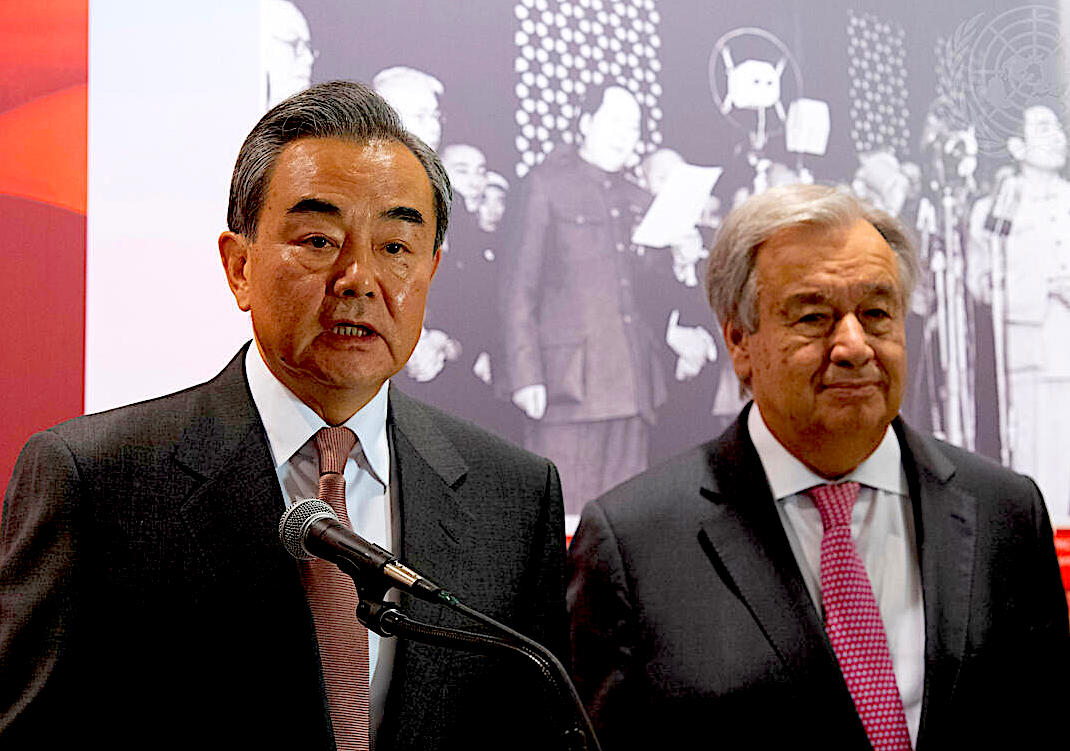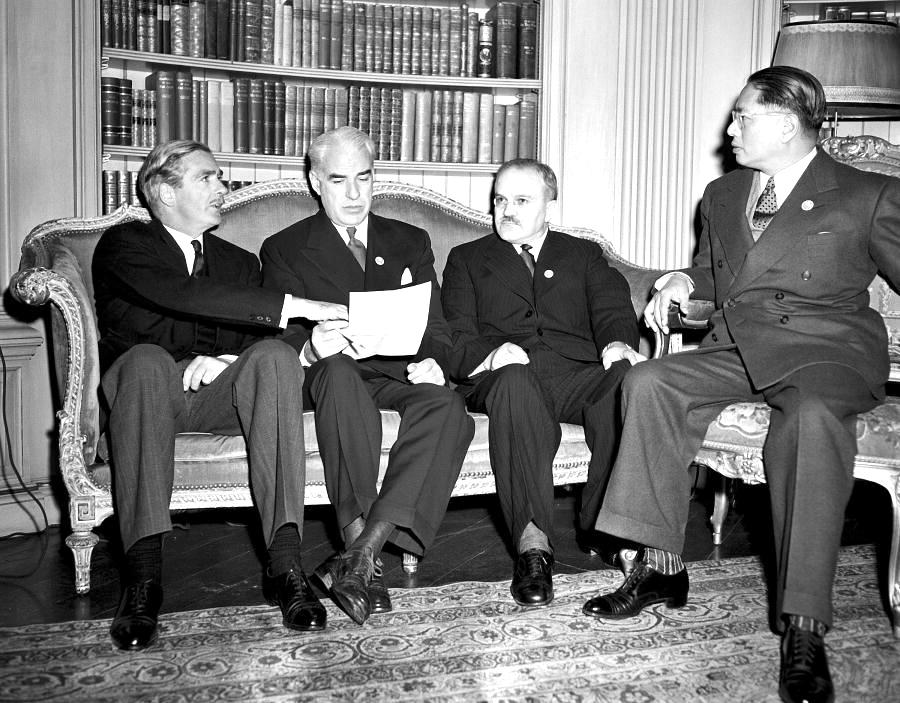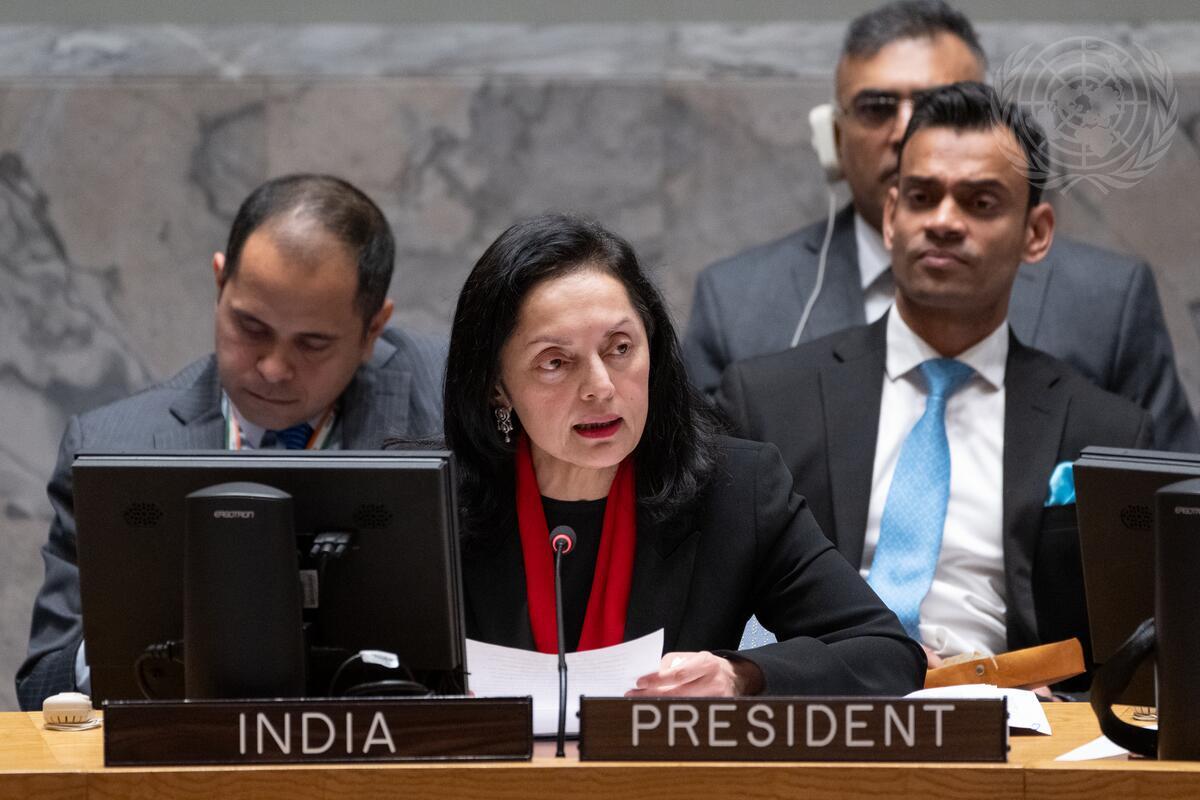Global South Aims to Fix the UN
UNITED NATIONS, 29 May 2023
Ramzy Baroud | Consortium News – TRANSCEND Media Service
Calls to reform the Security Council have been made many times in the past, but Beijing’s position is particularly important in both language and timing.

China’s Wang Yi, left, with U.N. Secretary-General António Guterres at a ceremony in 2019 marking the 70th anniversary of the founding of the People’s Republic of China.
(U.N. Photo/Evan Schneider)
23 May 2023 – In anticipation of next month’s United Nations Security Council talks on reforming the inherently archaic and dysfunctional political body, China’s foreign policy chief, Wang Yi, stated his country’s demands.
“The reform of the Security Council should uphold fairness and justice, increase the representation and voice of developing countries, allowing more small and medium-sized countries to have more opportunities to participate in the decision-making of the Council,” Wang Yi said in a statement on April 29.
More specifically, the new UNSC must “redress historical injustices against Africa,” he said.
Although calls for reforms of the UNSC have been made many times in the past, Beijing’s position is particularly important in both language and timing.
When the United Nations was founded in 1945 following World War II, it was meant to mark the rise of a new world order, one that was largely dominated by the winners of that horrific war, giving greater influence to the United States and its Western allies.
Indeed, of the 51 founding members of the U.N. back then, five countries were chosen to serve permanently on the Security Council — the executive branch of the U.N. The rest were given membership in the General Assembly, which played a marginal and, at times, even symbolic role in world affairs.

An informal meeting in the Fairmont Hotel in San Francisco during the 1945 signing of the U.N. Charter. From left: U.K.’s Anthony Eden, U.S.’ E.R. Stettinius Jr., Soviet Union’s V.M. Molotov and China’s T. V. Soong.
(U.N. Photo/Eastman)
Six other nations were allowed to serve as non-permanent members of the council, though they were not granted the same veto power exercised by the five powerful U.N. Security Council members.
A few years later, in 1963, the non-permanent membership status, served through bi-annual rotations, was expanded to 10, expanding the number of U.N. Security Council members to 15. However, the “reforms” ended there, never to be revisited.
Reflecting World Realities
The U.N. was hardly ever a democratic platform fairly reflecting the realities of the world, whether based on economic influence, demographics or any other indicators — aside from military might and political hegemony.
From the post-WWII geopolitical realities, however, the U.N. perfectly expressed a sad, unfair, but true global power.
That power is now shifting, and rapidly.
Calls for reforms have been underway for many years, exprsesed by the Group of Four (G4) — Brazil, Germany, India and Japan — and the Sirte Declaration of the African Union (AU) in 2005, among others. But renewed calls for U.N. Security Council reform in recent months have become louder, more significant and, indeed, more possible.
The Russia-Ukraine war, which has divided the world into political camps, further empowers China — the world’s soon-to-be largest economy — and emboldened countries in the Middle East, Africa and South America.

U.N. Secretary-General António Guterres, center right, with Ukraine’s President Volodymyr Zelensky, center left, in Kiev on March 8 to negotiate the continuation of the Black Sea Grain Initiative.
(U.N. Photo/Vitalii Ukhov)
Of the many indicators of a global power shift, the BRICS nations — Brazil, Russia, India, China and South Africa — have proven to be the greatest success story in challenging Western dominance over global markets and the status of the dollar as the world’s main currency.
As BRICS readies for a major membership expansion, it is poised to become the world’s leading economic forum — ahead of the powerful G7.
One of the BRICS members, India, as of April 2023, overtook China to become the world’s most populous country. Along with China and the combined demographics and wealth of other BRICS countries, it becomes unacceptable that a BRICS member such as India is still not a permanent member of the U.N. Security Council. The same applies to Brazil.
Indian U.N. Ambassador Ruchira Kamboj recently referred to the U.N. Charter as “anachronistic.” She said during a debate on the Charter: “Can we practice ‘effective multilateralism’ by defending a charter that makes five nations more equal than others and provides to each of those five the power to ignore the collective will of the remaining 188 member states?”

India’s U.N. Ambassador Ruchira Kamboj in 2022, while serving as president of the Security Council for the month of December. (U.N. Photo/Eskinder Debebe)
Her logic carries greater weight now that her country — along with other BRICS nations, the collective power of the African Union among other nations and political entities — is in a much stronger position to bargain for substantive change.
China, on the other hand, is already a permanent U.N. Security Council member, holding veto power.
The fact that Wang Yi is demanding serious changes at the U.N., particularly in the makeup of the Security Council, is a powerful indicator of China’s new global foreign policy agenda. As a rising superpower with close and deepening ties with many countries in the Global South, China rightly believes it’s in its interests to demand inclusion and fair representation for others.
This is an unmistakable sign of political maturity by Beijing, which will surely be resisted by the U.S. and other European powers.
The West is keen on either maintaining the U.N. Security Council’s West-leaning status as it is, or, if it must, engaging in superficial or self-serving reforms. This would be unacceptable for China and the rest of the Global South.
The U.N.’s reputation is already in tatters following its failure to address international conflicts, climate change, global pandemics and more. If the Council is not reformed to address global challenges more democratically, the U.N. risks its relevance.
___________________________________________
 Ramzy Baroud is a journalist, author and editor of Palestine Chronicle. He has a Ph.D. in Palestine Studies from the University of Exeter and has been writing about the Middle East for over 20 years. Baroud is a Non-Resident Scholar at Orfalea Center for Global and International Studies, University of California Santa Barbara. His books include Searching Jenin, The Second Palestinian Intifada, and My Father Was a Freedom Fighter: Gaza’s Untold Story. His latest book is The Last Earth: A Palestinian Story (Pluto Press, London, 2018). His website is www.ramzybaroud.net.
Ramzy Baroud is a journalist, author and editor of Palestine Chronicle. He has a Ph.D. in Palestine Studies from the University of Exeter and has been writing about the Middle East for over 20 years. Baroud is a Non-Resident Scholar at Orfalea Center for Global and International Studies, University of California Santa Barbara. His books include Searching Jenin, The Second Palestinian Intifada, and My Father Was a Freedom Fighter: Gaza’s Untold Story. His latest book is The Last Earth: A Palestinian Story (Pluto Press, London, 2018). His website is www.ramzybaroud.net.
Go to Original – consortiumnews.com
Tags: Global South, United Nations
DISCLAIMER: The statements, views and opinions expressed in pieces republished here are solely those of the authors and do not necessarily represent those of TMS. In accordance with title 17 U.S.C. section 107, this material is distributed without profit to those who have expressed a prior interest in receiving the included information for research and educational purposes. TMS has no affiliation whatsoever with the originator of this article nor is TMS endorsed or sponsored by the originator. “GO TO ORIGINAL” links are provided as a convenience to our readers and allow for verification of authenticity. However, as originating pages are often updated by their originating host sites, the versions posted may not match the versions our readers view when clicking the “GO TO ORIGINAL” links. This site contains copyrighted material the use of which has not always been specifically authorized by the copyright owner. We are making such material available in our efforts to advance understanding of environmental, political, human rights, economic, democracy, scientific, and social justice issues, etc. We believe this constitutes a ‘fair use’ of any such copyrighted material as provided for in section 107 of the US Copyright Law. In accordance with Title 17 U.S.C. Section 107, the material on this site is distributed without profit to those who have expressed a prior interest in receiving the included information for research and educational purposes. For more information go to: http://www.law.cornell.edu/uscode/17/107.shtml. If you wish to use copyrighted material from this site for purposes of your own that go beyond ‘fair use’, you must obtain permission from the copyright owner.